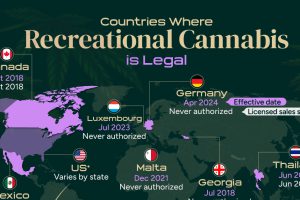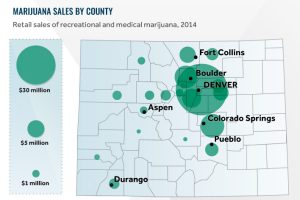Consumer Archetypes Shaping the European CBD Industry
View the high-resolution of the infographic by clicking here.
With a colossal base of 500 million potential cannabis consumers, and laws that are loosening at a steady pace, Europe could soon emerge as the global cannabis leader.
Cannabidiol, better known as CBD, has become one of the most popular forms of cannabis in the European market, but little is known about the consumers who are reaching for it.
New Frontier Data identified a spectrum of archetypes in an effort to better understand their consumption patterns.
What Makes Europe Different?
Although Europe’s cannabis market is still in early stages, the proximity of countries could be instrumental in how quickly it grows. Widespread legalisation could be accelerated due to neighbouring countries lowering the barriers for others—also known as The Domino Effect.
A total of 22 countries have now legalised some form of medical cannabis, while other countries have decriminalised recreational cannabis or have pledged to fully legalise it in the coming years.
There is a 60% to 70% chance that cannabis will be legal across Europe within the next three years, but more research is key to unlocking growth in this market—and that includes gaining a full understanding of what consumers want.
CBD Consumer Archetypes
New Frontier Data identified five CBD consumer archetypes and four non-consumer archetypes, based on their attitudes, beliefs, and experiences. The CBD consumer archetypes are as follows:
- The Exuberant & Intense (11%): As advocates of the CBD movement, this group is devoted to trying different products and spends more than any other archetype in the process.
- The Integrative & Consistent (29%): CBD has become an essential component in achieving a healthy lifestyle for this group, resulting in them consuming it at least once a week and putting them in second place for highest overall spend.
- The Sceptical & Limited (20%): CBD products are used in moderate frequency, but have not been incorporated into this group’s lifestyle as they are generally wary of health claims. However, more information may soothe the concerns of this group over time.
- The Receptive & Reserved (23%): Consuming a narrow range of products in moderate frequency, this group are more comfortable trying products based on recommendations from friends and family. Over time, as more people in their inner circle try different products, they will also gain confidence to follow.
- The Ambivalent & Experimental (17%): This group will not consider purchasing CBD products themselves, but will consume products when they are shared by friends and family. While their beliefs are more conservative, new products could tempt them to make CBD part of their routine.
Interestingly, up to 98% of surveyed consumers claim that CBD has positively affected their quality of life in some way. In terms of product preferences, tinctures/oils are a consumer favourite, with a large portion of people using CBD to unwind.
Non-consumer Archetypes
Less than half of all non-consumers have heard of CBD. While some of them are not open to changing behaviors, others could soon convert to a consumer archetype, provided information and legalisation becomes more commonplace.
- Unaware & Uninterested (43%): Having never come across CBD products online or in store, this group is broadly uninterested in learning more, but may be open to experimenting as the market becomes more regulated.
- Knowledgeable & Primed (28%): This group expresses a strong belief in the benefits of CBD and their curiosity to learn more makes them the most likely group to become consumers in the next six months.
- Informed & Indifferent (19%): A wide exposure to CBD products does not translate to intent to purchase, potentially due to this group’s lack of awareness regarding CBD’s beneficial properties.
- Cautious & Curious (10%): Despite a strong curiosity towards CBD products, they remain apprehensive about the safety and legality of them.
Overall, 34% of non-consumers are curious about trying CBD products—which could yield significant growth for the cannabis industry in the coming years.
A New Successor to the Throne
The recent COVID-19 outbreak has also sparked major discussion around the use of cannabis. Some parts of the world have declared it as “essential”, as consumers use products to alleviate pandemic-fuelled anxiety, which has resulted in a huge sales boost for the industry.
This will likely translate to Europe, where almost half of CBD consumers claim its therapeutic benefits are their primary reason for use.
The reality is that the potential for European cannabis growth is significant, and to achieve this, both consumer and non-consumer motivations should be considered.





